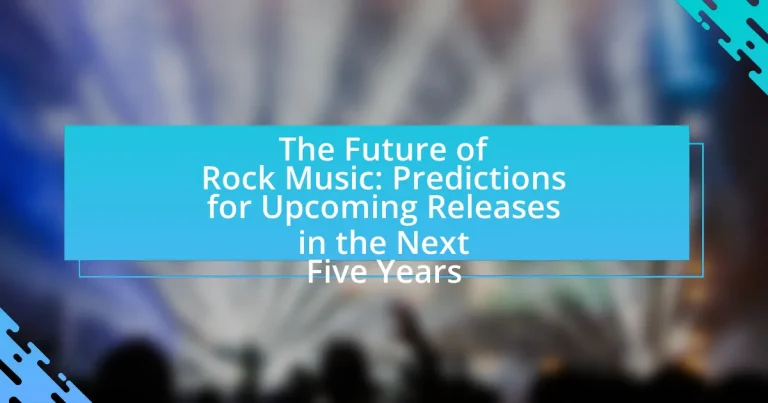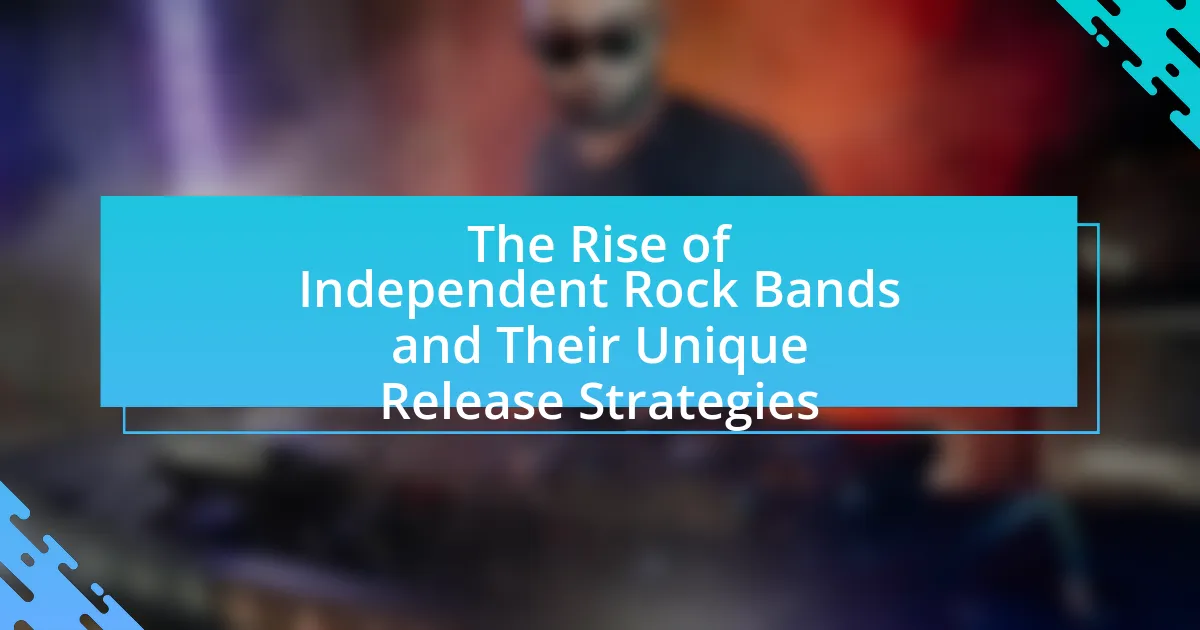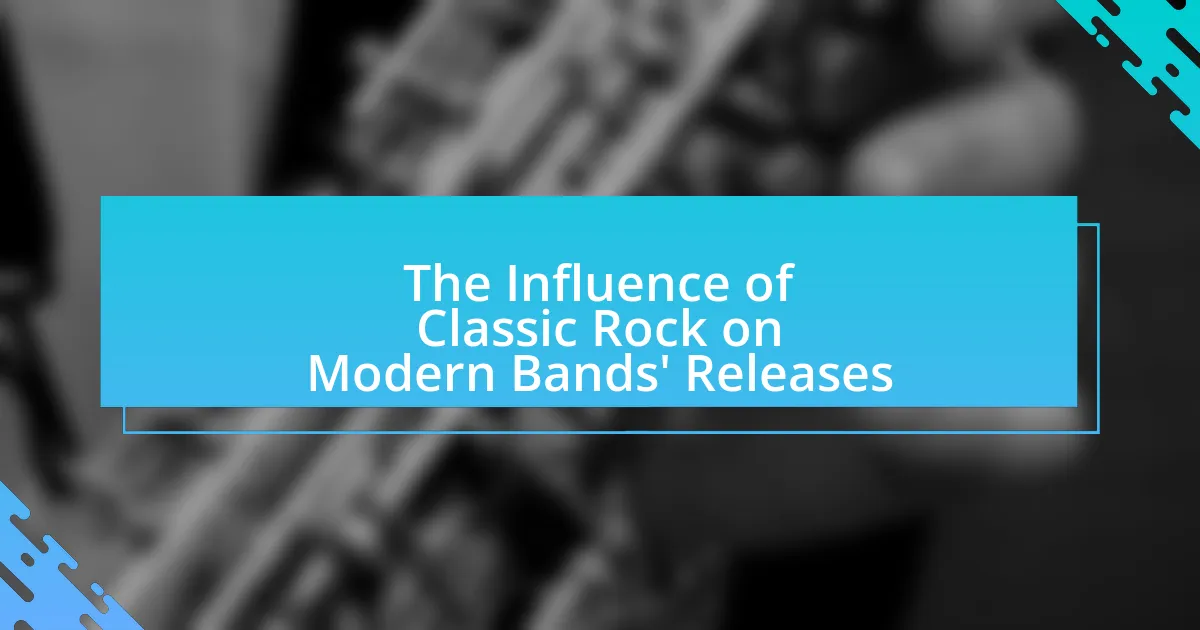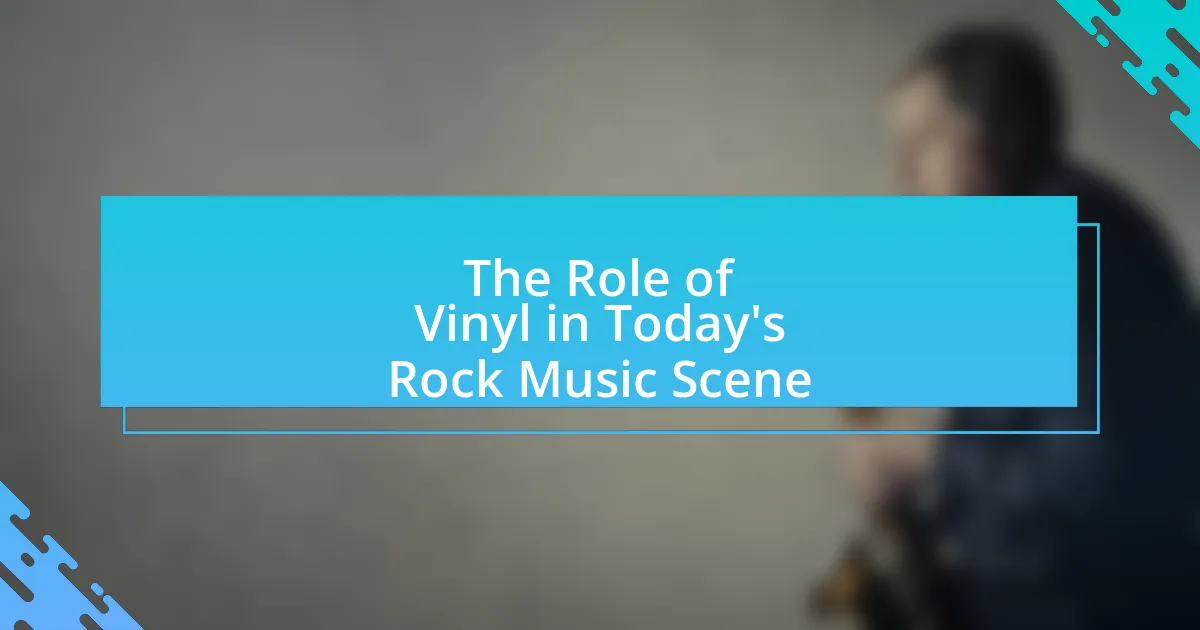The article focuses on the future of rock music, predicting significant developments over the next five years. It highlights a resurgence in popularity driven by nostalgia and innovation, with established bands releasing new albums and emerging artists blending diverse genres. Key trends include the influence of streaming platforms on accessibility, the impact of technological advancements on music production, and the role of social and political themes in upcoming releases. Additionally, the article discusses anticipated album releases, the evolution of live performances, and the importance of collaborations in shaping the rock genre’s future.
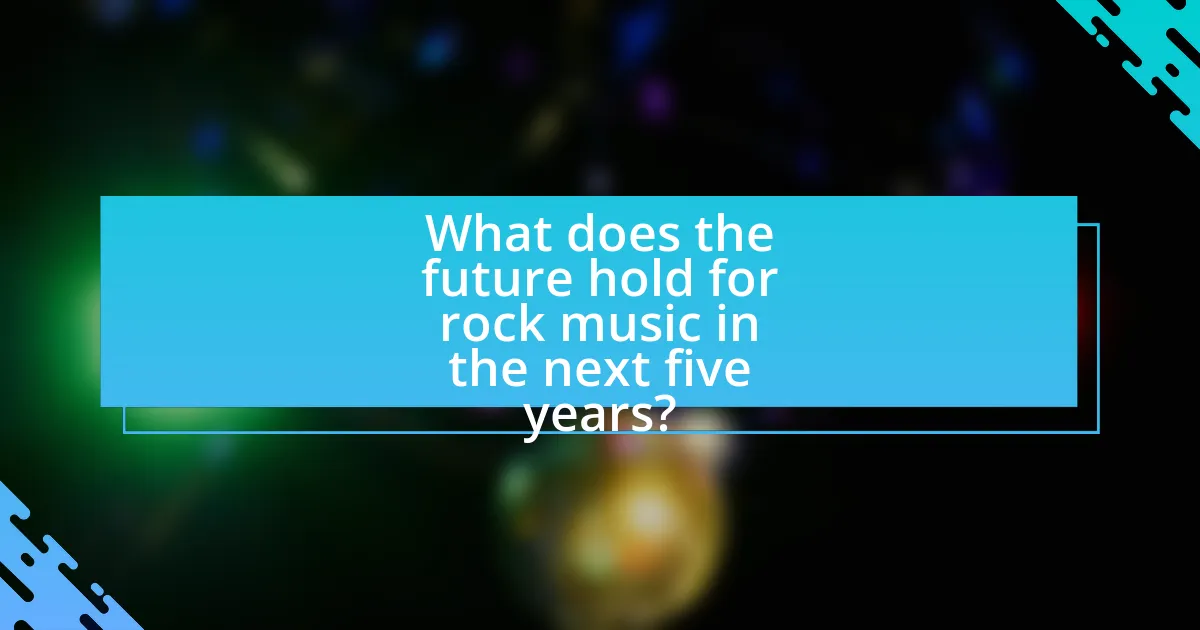
What does the future hold for rock music in the next five years?
The future of rock music in the next five years is likely to see a resurgence in popularity, driven by a blend of nostalgia and innovation. Established rock bands are expected to release new albums, while emerging artists will incorporate diverse genres, such as electronic and hip-hop, into their sound. For instance, the Rock and Roll Hall of Fame has noted an increase in younger artists drawing inspiration from classic rock, indicating a revival of interest in the genre. Additionally, streaming platforms are facilitating greater access to rock music, allowing for a wider audience reach and engagement. This trend suggests that rock music will continue to evolve while maintaining its core identity, appealing to both long-time fans and new listeners.
How are current trends shaping the future of rock music?
Current trends are shaping the future of rock music by integrating diverse genres and leveraging digital platforms for distribution and collaboration. The blending of rock with electronic, hip-hop, and pop elements is creating hybrid sounds that appeal to broader audiences, as evidenced by artists like Machine Gun Kelly and Halsey, who incorporate rock influences into their music. Additionally, the rise of streaming services has transformed how rock music is consumed, allowing for greater accessibility and the emergence of independent artists. According to a report by the Recording Industry Association of America, streaming accounted for 83% of the music industry’s revenue in 2022, highlighting the importance of digital platforms in shaping musical trends. This shift is likely to continue influencing the sound and reach of rock music in the coming years.
What genres are influencing the evolution of rock music?
Various genres are influencing the evolution of rock music, including pop, hip-hop, electronic, and indie. Pop music has introduced catchy melodies and production techniques that have been adopted by rock artists, leading to a more mainstream sound. Hip-hop’s rhythmic elements and lyrical styles have also permeated rock, resulting in collaborations and genre-blending tracks. Electronic music contributes innovative soundscapes and technology-driven production, pushing rock into new auditory territories. Additionally, the indie genre has fostered a DIY ethic and diverse influences, encouraging rock musicians to experiment with unconventional sounds and structures. These influences are reshaping rock music, making it more versatile and reflective of contemporary musical trends.
How are technological advancements impacting rock music production?
Technological advancements are significantly enhancing rock music production by streamlining recording processes and expanding creative possibilities. Innovations such as digital audio workstations (DAWs), advanced plugins, and virtual instruments allow producers to manipulate sound with unprecedented precision and flexibility. For instance, the use of software like Pro Tools and Ableton Live enables artists to record, edit, and mix tracks more efficiently than traditional analog methods. Additionally, the rise of artificial intelligence in music production is facilitating new songwriting techniques and sound design, as seen in tools like AIVA and Amper Music, which can generate original compositions. These advancements not only improve the quality of sound but also democratize music production, allowing independent artists to produce high-quality recordings without the need for expensive studio time.
What role do emerging artists play in the future of rock music?
Emerging artists play a crucial role in shaping the future of rock music by introducing innovative sounds and diverse influences that reflect contemporary culture. These artists often challenge traditional rock norms, incorporating elements from genres such as hip-hop, electronic, and indie, which can lead to the evolution of the rock genre itself. For instance, the rise of artists like Billie Eilish and Machine Gun Kelly demonstrates how new talent can blend rock with pop and rap, attracting younger audiences and revitalizing interest in the genre. This trend is supported by data showing that streaming platforms have increased the visibility of emerging artists, allowing them to reach wider audiences and gain traction in the music industry. As a result, emerging artists are not only preserving the essence of rock music but also ensuring its relevance in a rapidly changing musical landscape.
Which new artists are gaining traction in the rock scene?
New artists gaining traction in the rock scene include bands like Greta Van Fleet, who have achieved significant popularity with their classic rock-inspired sound, and artists such as YUNGBLUD, known for blending rock with punk and pop influences. Additionally, the band Mammoth WVH, led by Wolfgang Van Halen, has been making waves with their self-titled debut album, showcasing a modern rock sound. These artists have garnered attention through extensive touring, streaming success, and positive critical reception, indicating a promising future in the rock genre.
How are established artists adapting to new musical landscapes?
Established artists are adapting to new musical landscapes by embracing digital platforms and collaborating across genres. Many artists are utilizing streaming services to reach wider audiences, as evidenced by the rise of platforms like Spotify and Apple Music, which have transformed music consumption habits. Additionally, collaborations with emerging artists from diverse genres allow established musicians to innovate and stay relevant, as seen in recent projects where rock artists team up with hip-hop or electronic musicians. This strategic approach not only broadens their appeal but also reflects the evolving tastes of listeners in the contemporary music scene.
What are the anticipated themes and messages in upcoming rock releases?
Anticipated themes and messages in upcoming rock releases include social justice, mental health awareness, and environmental concerns. Artists are increasingly addressing societal issues, reflecting a growing trend where music serves as a platform for activism. For instance, many bands are expected to explore the impact of the COVID-19 pandemic on mental health, as seen in recent releases that tackle isolation and anxiety. Additionally, environmental themes are likely to resonate, following the rise of climate activism, with bands using their music to advocate for sustainability and awareness. This aligns with the historical context of rock music as a vehicle for change, reminiscent of the 1960s and 1970s movements.
How are social and political issues reflected in new rock music?
Social and political issues are prominently reflected in new rock music through lyrics that address themes such as inequality, climate change, and social justice. For instance, many contemporary rock bands incorporate direct references to movements like Black Lives Matter and environmental activism, using their platform to raise awareness and provoke thought among listeners. The song “This Is America” by Childish Gambino, while not strictly rock, has influenced rock artists to engage with similar themes, showcasing the genre’s adaptability to current events. Additionally, statistics indicate that a significant percentage of new rock songs released in the past few years contain explicit political messages, highlighting the genre’s role as a vehicle for social commentary.
What personal experiences are artists likely to explore in their lyrics?
Artists are likely to explore personal experiences such as love, heartbreak, mental health struggles, and social issues in their lyrics. These themes resonate deeply with listeners, as they reflect universal emotions and challenges. For instance, many rock artists have historically drawn from their own life experiences, with songs addressing topics like addiction, loss, and identity crises, which can be seen in the works of bands like Nirvana and Linkin Park. This trend is supported by research indicating that autobiographical elements in music enhance emotional connection and relatability, making these experiences a focal point in contemporary songwriting.
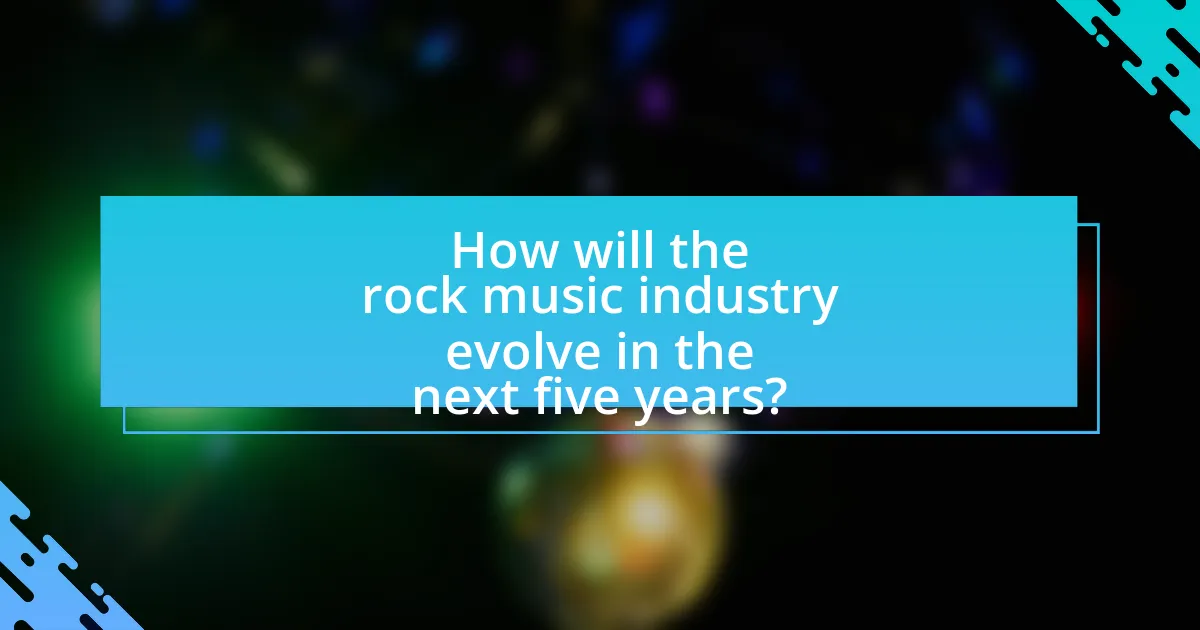
How will the rock music industry evolve in the next five years?
The rock music industry will evolve significantly in the next five years through increased integration of digital technology and a resurgence of live performances. The rise of streaming platforms has already transformed music consumption, and this trend will continue, with artists leveraging social media and virtual reality to engage fans. According to a report by the International Federation of the Phonographic Industry, global music streaming revenues grew by 19.9% in 2020, indicating a shift in how audiences access music. Additionally, as live events return post-pandemic, rock bands are expected to capitalize on this demand, leading to a revival of concert culture. This combination of digital innovation and live engagement will shape the future landscape of the rock music industry.
What changes can we expect in music distribution and consumption?
We can expect significant changes in music distribution and consumption driven by advancements in technology and shifts in consumer behavior. The rise of streaming platforms has already transformed how music is accessed, leading to a decline in physical sales and digital downloads. According to the Recording Industry Association of America (RIAA), streaming accounted for 83% of the U.S. music industry’s revenue in 2022, highlighting the dominance of this model. Additionally, the integration of artificial intelligence in music curation and personalized recommendations is likely to enhance user experience, making it easier for listeners to discover new rock music. Furthermore, the growth of blockchain technology may introduce more direct artist-to-fan sales models, allowing musicians to retain a larger share of their earnings. These trends indicate a continued evolution in how music is distributed and consumed, emphasizing convenience and accessibility for audiences.
How are streaming platforms influencing rock music accessibility?
Streaming platforms are significantly enhancing rock music accessibility by providing a vast library of songs that can be accessed anytime and anywhere. These platforms, such as Spotify and Apple Music, allow users to discover both mainstream and independent rock artists through curated playlists, algorithm-driven recommendations, and user-generated content. According to a report by the Recording Industry Association of America, streaming accounted for 83% of the U.S. music industry’s revenue in 2021, indicating a shift in how audiences consume music. This accessibility enables listeners to explore diverse subgenres and emerging artists, fostering a more inclusive rock music community.
What role will live performances play in the future of rock music?
Live performances will play a crucial role in the future of rock music by serving as a primary means of engagement and revenue generation for artists. As streaming services dominate music consumption, live shows will become essential for artists to connect with fans and create memorable experiences. According to a report by the International Music Summit, live music revenues are projected to reach $31 billion by 2025, highlighting the increasing importance of concerts and festivals in the music industry. This trend indicates that rock musicians will rely heavily on live performances to sustain their careers and foster community among fans.
How are collaborations shaping the future of rock music?
Collaborations are significantly shaping the future of rock music by blending diverse genres and attracting new audiences. This trend is evident in recent projects where rock artists partner with musicians from hip-hop, pop, and electronic music, resulting in innovative sounds that appeal to a broader demographic. For instance, the collaboration between rock band Imagine Dragons and rapper Lil Wayne on the track “Believer” showcases how cross-genre partnerships can enhance the reach and relevance of rock music in contemporary culture. Additionally, statistics indicate that songs featuring collaborations often achieve higher chart positions, reflecting their commercial success and the growing acceptance of genre-blending in the music industry.
What notable collaborations are expected in the coming years?
Notable collaborations expected in the coming years include partnerships between established rock artists and emerging musicians, as well as cross-genre collaborations. For instance, artists like Dave Grohl and Billie Eilish have hinted at potential projects together, which could blend classic rock with contemporary pop influences. Additionally, the resurgence of interest in supergroups, such as the collaboration between members of Foo Fighters and Queens of the Stone Age, suggests that more such alliances are likely to emerge. These collaborations are anticipated to innovate the rock genre, drawing from diverse musical backgrounds and appealing to a broader audience.
How do cross-genre collaborations impact rock music’s evolution?
Cross-genre collaborations significantly impact rock music’s evolution by introducing diverse influences and expanding its sonic boundaries. These collaborations often blend elements from genres such as hip-hop, electronic, and pop, resulting in innovative sounds that attract new audiences. For instance, the collaboration between rock band Linkin Park and rapper Jay-Z on the “Collision Course” EP in 2004 showcased how merging rock with hip-hop can create commercially successful and critically acclaimed music, leading to a resurgence in rock’s popularity. Additionally, artists like Billie Eilish and Halsey, who incorporate rock elements into their pop music, demonstrate how cross-genre partnerships can revitalize rock’s relevance in contemporary music scenes. This evolution reflects a broader trend where rock adapts to changing musical landscapes, ensuring its continued presence in the industry.
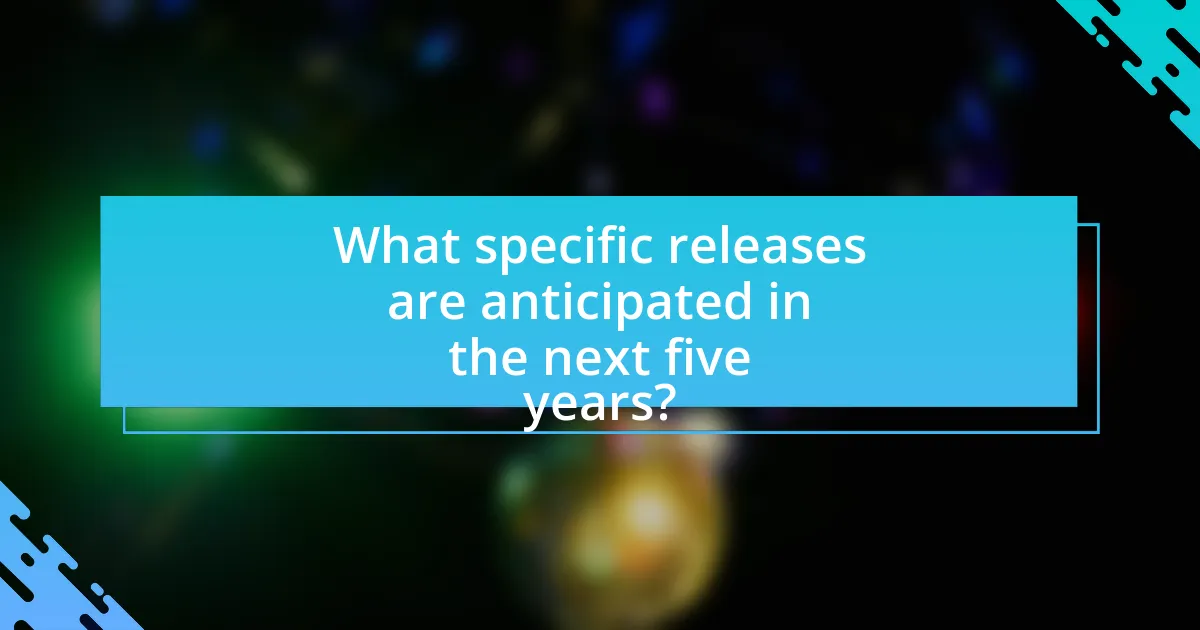
What specific releases are anticipated in the next five years?
In the next five years, anticipated releases in rock music include new albums from prominent bands and artists such as Foo Fighters, who are expected to release their next album in 2024, and Metallica, with their upcoming project slated for 2025. Additionally, the Red Hot Chili Peppers are rumored to be working on new material, potentially releasing it by 2026. These projections are based on announcements made by the artists and industry insiders, confirming their active engagement in creating new music.
Which upcoming albums are generating buzz in the rock community?
Upcoming albums generating buzz in the rock community include “The Car” by Arctic Monkeys, set for release in October 2023, and “Crisis” by the band The Offspring, expected in early 2024. These albums have been highlighted in various music publications and social media platforms, indicating strong anticipation among fans and critics alike. The Arctic Monkeys’ previous album, “Tranquility Base Hotel & Casino,” received critical acclaim, which adds to the excitement for their new release. Similarly, The Offspring’s return after a hiatus has sparked discussions about their evolving sound and potential chart performance.
What can fans expect from highly anticipated rock albums?
Fans can expect a blend of innovative sounds and nostalgic elements from highly anticipated rock albums. Many artists are incorporating modern production techniques while paying homage to classic rock influences, creating a unique fusion that appeals to both new listeners and long-time fans. For instance, recent trends show a resurgence of guitar-driven melodies and powerful vocals, reminiscent of the 70s and 80s rock era, combined with contemporary themes and lyrical depth. This approach is evident in the works of bands like Foo Fighters and Paramore, who have successfully merged traditional rock with modern influences, indicating a promising evolution in the genre.
How are album release strategies changing in the rock genre?
Album release strategies in the rock genre are increasingly shifting towards digital-first approaches and experiential marketing. Artists are now prioritizing streaming platforms and social media for album launches, often releasing singles ahead of full albums to build anticipation and engage audiences. For instance, many rock bands are utilizing platforms like Spotify and Apple Music to release exclusive content, such as live recordings or behind-the-scenes footage, which enhances fan interaction and loyalty. This trend is supported by data showing that over 80% of music consumption now occurs through streaming services, indicating a significant departure from traditional physical album releases.
What are the predictions for rock music festivals and events?
Predictions for rock music festivals and events indicate a resurgence in attendance and diversity in lineups over the next five years. Industry reports suggest that as live music continues to recover post-pandemic, festivals will likely see increased participation, with a projected growth rate of 10% annually in attendance figures. Additionally, the integration of technology, such as virtual reality experiences and live streaming, is expected to enhance audience engagement, making festivals more accessible to global fans. Historical data from 2022 shows that major rock festivals like Coachella and Glastonbury experienced record ticket sales, reinforcing the trend of growing interest in live rock music events.
Which festivals are expected to feature major rock lineups?
Festivals expected to feature major rock lineups include Coachella, Lollapalooza, and Glastonbury. Coachella has consistently showcased top rock acts, with its 2023 lineup featuring renowned bands. Lollapalooza, held annually in Chicago, is known for its diverse rock representation, attracting major artists each year. Glastonbury, one of the largest music festivals globally, has a history of headlining iconic rock bands, making it a key event for rock music enthusiasts.
How are festivals adapting to the changing landscape of rock music?
Festivals are adapting to the changing landscape of rock music by diversifying their lineups to include a broader range of genres and emerging artists. This shift reflects the declining mainstream popularity of traditional rock, as evidenced by data showing that rock music’s share of total music consumption has decreased from 36% in 2010 to 22% in 2020, according to the Recording Industry Association of America. Additionally, festivals are incorporating interactive experiences and technology, such as virtual reality and live streaming, to engage younger audiences who prefer digital consumption. This evolution ensures that festivals remain relevant and appealing in a rapidly changing musical environment.
What practical tips can fans use to stay updated on future rock releases?
Fans can stay updated on future rock releases by subscribing to music streaming services that offer notifications for new albums and singles. Services like Spotify and Apple Music allow users to follow their favorite artists, ensuring they receive alerts when new music is released. Additionally, fans should follow rock music blogs and websites such as Pitchfork and Rolling Stone, which frequently publish news about upcoming releases and artist interviews. Social media platforms, particularly Twitter and Instagram, are also valuable for real-time updates, as many artists announce new projects directly to their followers. Furthermore, joining fan clubs or mailing lists can provide exclusive information about release dates and pre-order opportunities. These methods collectively ensure that fans remain informed about the latest developments in the rock music scene.
How can fans discover new rock music and artists effectively?
Fans can effectively discover new rock music and artists by utilizing streaming platforms, social media, and music discovery apps. Streaming platforms like Spotify and Apple Music offer curated playlists and algorithm-driven recommendations based on listening habits, which can introduce fans to emerging rock artists. Social media platforms, particularly Instagram and TikTok, allow fans to follow artists directly and engage with their content, often leading to the discovery of new music through viral trends. Additionally, music discovery apps such as Bandcamp and SoundCloud provide access to independent artists and niche genres, enabling fans to explore a wider array of rock music. These methods are supported by data indicating that 70% of music listeners discover new artists through streaming services, highlighting their effectiveness in music discovery.
What resources are available for tracking upcoming rock music events?
Online platforms such as Songkick, Bandsintown, and Eventbrite are essential resources for tracking upcoming rock music events. These platforms aggregate concert listings, allowing users to follow their favorite artists and receive notifications about new shows. For instance, Songkick provides personalized concert alerts based on user preferences and location, while Bandsintown offers a similar service with a focus on artist engagement. Eventbrite lists a wide range of events, including smaller local shows, making it a comprehensive tool for discovering rock music events.












